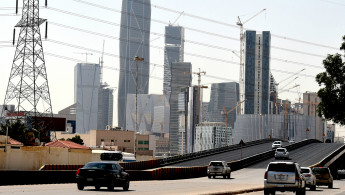Riyadh set to seize Lebanese Prime Minister Saad Hariri's assets
Riyadh is moving to acquire assets still owned by Hariri in the now defunct Saudi Oger construction company in return for cancelling outstanding debts, a source has claimed.
The alleged move comes amid an anti-corruption crackdown that many critics have labelled as a shakedown of the kingdom's business and political elite.
"The restructuring of Saudi companies whose owners are involved in corruption cases are steaming ahead, starting with the Binladin group and now moving towards Saudi Oger," a source close to the Saudi authorities told The New Arab's sister publication, speaking on condition of anonymity.
"Although Saudi Oger does not have many assets left after liquidating its businesses, the authorities are determined to reclaim all funds and assets that were sold off," the source added.
The source claimed that the recent arrest of Jordanian-Saudi businessman Sabih al-Masri was linked to Saudi Oger and Hariri.
Saudi Oger was a once-mighty construction giant, founded by Lebanon's billionaire late Prime Minister Rafik Hariri, Saad's father, until is closed in July 2017.
It had built some of the most grandiose complexes in Riyadh, including the palatial Ritz-Carlton hotel, which became a luxury prison for Saudi royals and other elites caught in MbS' power grab.
Falling oil prices, a new leadership in Riyadh, construction accidents and corruption allegations saw an end to preferrential treatment for to Saudi Oger and Binladin Group, another Saudi construction giant.
The two companies found themselves struggling with debts in the new climate in Saudi Arabia.
Read also: Ritz-Carlton, Saudi Arabia's five-star hotel, to reopen for business
Saudi Oger ended operations in July after 39 years in the business, Saudi daily Okaz reported at the time.
While most of its assets have been transferred, it still has three projects, including a 15-year maintenance and operation contract for King Abdullah University of Science and Technology; the king's palace in Tangier; and a project in Mecca.
The government is now moving to 'restructure' these companies, amid accusations this amounts to nationalisation of private sector assets.
On Saturday, Saudi Binladin Group was forced to deny claims that Riyadh had taken over the company after its chairman was detained in an alleged anti-corruption campaign.
It did admit, however, that some shares may have been transferred to the government.
"All companies linked to those detained at the Ritz Carlton will be restructured, the assets belonging to the detainees seized by the Saudi government, including the MBC group," the source said.
In November, the heir to the throne, Crown Prince Mohammed bin Salman, launched a wide-ranging crackdown on dozens of elites, ostensibly to tackle corruption. Critics say it was also a way of consolidating his grip on power.
Most of those detained have struck monetary settlements in exchange for their freedom.
The suspects - who include high-profile princes and billionnaires - have been held at Riyadh's luxurious Ritz Carlton hotel since early November and were reportedly told to hand over assets and cash in exchange for their freedom.
Saudi authorities insist the financial settlements are not blackmail but an obligation to reimburse money taken illegally from the world's top oil producer over several decades.





 Follow the Middle East's top stories in English at The New Arab on Google News
Follow the Middle East's top stories in English at The New Arab on Google News
![Israeli forces ordered bombed Gaza's Jabalia, ordering residents to leave [Getty]](/sites/default/files/styles/image_330x185/public/2176418030.jpeg?h=a5f2f23a&itok=_YGZaP1z)

